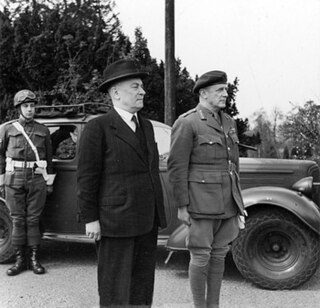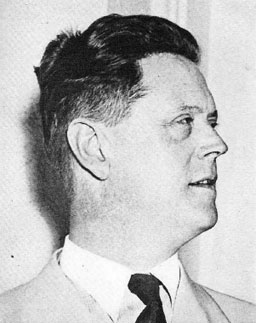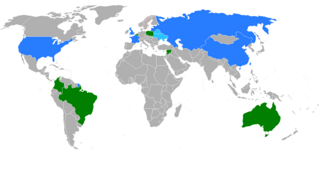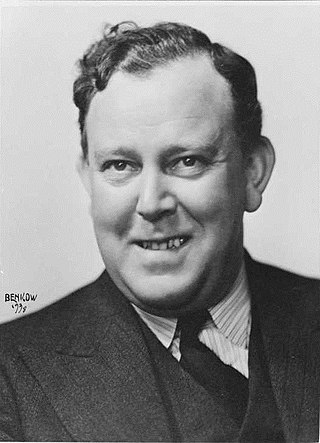Contents
| |||||
| Decades: | |||||
|---|---|---|---|---|---|
| See also: | Other events of 1946 List of years in Belgium | ||||
Events from the year 1946 in Belgium
| |||||
| Decades: | |||||
|---|---|---|---|---|---|
| See also: | Other events of 1946 List of years in Belgium | ||||
Events from the year 1946 in Belgium

Paul-Henri Charles Spaak was an influential Belgian Socialist politician, diplomat and statesman who thrice served as the prime minister of Belgium and later as the second secretary general of NATO. Along with Robert Schuman, Alcide De Gasperi and Konrad Adenauer, he was a leader in the formation of the institutions that evolved into the European Union.

Étienne, Count Davignon is a Belgian former diplomat, top civil servant, businessman, and former vice-president of the European Commission.

Achille Van Acker was a Belgian politician who served three terms as the prime minister of Belgium between 1946 and 1958. A moderate from Flanders, Van Acker was a member of the Belgian Socialist Party (PSB–BSP) and played an important role in the creation of the Belgian welfare state after World War II.

Hubert Marie Eugène Pierlot was a Belgian politician and Prime Minister of Belgium, serving between 1939 and 1945. Pierlot, a lawyer and jurist, served in World War I before entering politics in the 1920s. A member of the Catholic Party, Pierlot became Prime Minister in 1939, shortly before Belgium entered World War II. In this capacity, he headed the Belgian government in exile, first from France and later Britain, while Belgium was under German occupation. During the German invasion of Belgium in May 1940, a violent disagreement broke out between Pierlot and King Leopold III over whether the King should follow the orders of his ministers and go into exile or surrender to the German Army. Pierlot considered Leopold's subsequent surrender a breach of the Constitution and encouraged the parliament to declare Leopold unfit to reign. The confrontation provoked a lasting animosity between Pierlot and other conservatives, who supported the King's position and considered the government's exile to be cowardly.
Victor Joseph Léonard Larock was a Belgian politician for the country's Socialist Party.
Antoinette Spaak was a Belgian politician and leading figure within Francophone and regionalist politics in Brussels. She was born into a noted political family and entered politics as part of the regionalist Democratic Front of Francophones in 1972. She held the presidency of the FDF from 1977 to 1982 and later advocated conciliation between Francophone centrist political parties. This brought the FDF into an electoral coalition ahead of the 1999 election and paved the way for its absorption into the Reformist Movement in 2002. Spaak held various political offices in Belgium and the European Communities until retiring from politics in 2009.

General elections were held in Belgium on 17 February 1946. The result was a victory for the Christian Social Party, which won 92 of the 202 seats in the Chamber of Representatives and 51 of the 101 seats in the Senate. Voter turnout was 90.3%.

Baron Robert Rothschild was a Belgian diplomat. He helped to draft the Treaty of Rome of 1957, the foundation of the European Economic Community (EEC) in 1958.

The Messina Conference of 1955 was a meeting of the six member states of the European Coal and Steel Community (ECSC). The conference assessed the progress of the ECSC and, deciding that it was working well, proposed further European integration. This initiative led to the creation in 1957 of the European Economic Community and Euratom.

The Belgian Government in London, also known as the Pierlot IV Government, was the government in exile of Belgium between October 1940 and September 1944 during World War II. The government was tripartite, involving ministers from the Catholic, Liberal and Labour Parties. After the invasion of Belgium by Nazi Germany in May 1940, the Belgian government, under Prime Minister Hubert Pierlot, fled first to Bordeaux in France and then to London, where it established itself as the only legitimate representation of Belgium to the Allies.

The royal question was a major political crisis in Belgium that lasted from 1945 to 1951, coming to a head between March and August 1950. The question at stake surrounded whether King Leopold III could return to the country and resume his constitutional role amid allegations that his actions during World War II had been contrary to the provisions of the Belgian Constitution. The crisis brought Belgium to the brink of a civil war. It was eventually resolved by the abdication of Leopold in favour of his son King Baudouin in 1951.

The first ever United Nations Security Council elections were held on 12 January 1946 during the 1st session of the United Nations General Assembly, held at Westminster Central Hall in the City of Westminster, London, England, United Kingdom. The elections were for six non-permanent seats on the UN Security Council for two- and one-year mandates commencing immediately upon election, and to expire upon the date of the next elections, in November 1946 and September 1947, respectively.

Albert De Vleeschauwer, later Baron Albert De Vleeschauwer van Braekel, was a Belgian politician of the Catholic Party.

The first session of the United Nations General Assembly opened on 10 January 1946 at the Methodist Central Hall in London.

The second 1946 United Nations Security Council election was held on 19 November 1946 during the First session of the United Nations General Assembly. The General Assembly elected Belgium, Colombia, and Syria, as the three new non-permanent members of the UN Security Council for two-year mandates commencing in January 1947.

The United Nations Secretary-General selection of 1946 took place at the opening session of the United Nations in London. The General Assembly first voted on the membership of the Security Council, which then selected the first Secretary-General of the United Nations. The United States and the United Kingdom supported Lester B. Pearson of Canada for Secretary-General, but the Soviet Union opposed Pearson since the permanent headquarters of the United Nations would be in North America. The Security Council compromised on Trygve Lie of Norway, who had lost the election for President of the General Assembly to Paul-Henri Spaak of Belgium.
Events of the year 1939 in Belgium.
Events from the year 1949 in Belgium
The Van Acker I Government was the government coalition in the Kingdom of Belgium from 1945-1946, after the fall of Hubert Pierlot's 6th coalition government in the aftermath of the Second World War. The government, with Achille Van Acker of the Belgian Socialist Party as Prime Minister, served for four months; from the restoration of democracy until June 15, 1945. Van Acker would form another coalition, which would serve for six months until the 1946 Belgian general election.